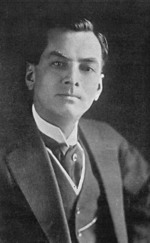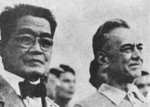Manuel Quezon
| Surname | Quezon |
| Given Name | Manuel |
| Born | 19 Aug 1878 |
| Died | 1 Aug 1944 |
| Country | Philippines |
| Category | Government |
| Gender | Male |
Contributor: C. Peter Chen
ww2dbaseManuel Luis Quezon y Molina was born in Tayabas (now Aurora); a mestizo, his parents were Spanish and Filipino. After fighting alongside of fellow nationalists against American occupation troops, he completed his studies at the University of Santo Tomas and passed the bar exam in 1903. He entered government service after receiving his law degree. He became the governor of his home province of Tayabas in 1906, elected to the first Assembly in 1907, and served in Washington as one of the Philippines' two resident commissioners to the House of Representatives in 1909 until 1916. After he returned to his country as the Philippines' Senate President, and held the position until 1936 when he sworn in as the nation's first elected president. Although he was the first official president of the Philippines, some considered his predecessor Emilio Aquinaldo the first president, who held the title but did not receive international recognition at the time.
ww2dbaseQuezon was a personal friend of Douglas MacArthur's. Even more so, they were family: Manuel Quezon was the compadre (somewhat comparable to the "godfather" relationship in the United States, but not completely alike; there is no direct translation of this Filipino concept) to Douglas MacArthur's son, Arthur. MacArthur's wife Jean and Quezon's wife Aurora were also good friends; Jean described her relationship with the Quezons with a simple statement "we drank from the same cup". When MacArthur retired from the United States Army in 1935, Quezon courted him back to the Philippines as the commander of the young nation's military, with the title Field Marshal which had never been, nor ever would be, held by another American general. When the Japanese invaded his country, he retreated to Corregidor, "the Rock", with MacArthur, and demanded the United States military aid that never came. He would grow bitter toward the United States as his country was overrun by Japanese troops (though he never truly lost respect for the US), one time shouting publicly after listening to one of Roosevelt's fireside chats: "come, listen to this scoundrel! Que demonio! How typical of America to writhe in anguish at the fate of a distant cousin, Europe, while a daughter, the Philippines, is being raped in the back room!". Seeing no aid from Washington, Quezon contemplated pleading for the Commonwealth's independence, thinking that he would be able to declare neutrality and see to the exit of military of both Japan and the United States, declaring Philippines "the Switzerland of the Far East". He was convinced by MacArthur that Japan would not respect such an independence, and withdrew that notion, if only for a short while. On 8 Feb, he could no longer tolerate the lack of aid from the United States. He sent Roosevelt, via US War Department channels, this message:
ww2dbaseRoosevelt, perhaps as expected, denied Quezon's request for independence.
ww2dbaseReluctantly, Quezon boarded the submarine USS Swordfish on 22 Feb 1942 and headed for America, with him a box given by MacArthur, filled with the American's medals, photos, marriage certificate, and other personal items he did not want to risk Japanese capture. Quezon knew that MacArthur was expecting a final showdown against the Japanese, and his friend would risk death for the Philippines. Before he boarded the submarine, Quezon slipped off his signet ring, and placed on MacArthur's finger. "When they find your body," Quezon said to his Field Mashal, "I want them to know that you fought for my country." Dwight Eisenhower, who served under MacArthur in Philippines immediately before the war, said that Quezon "clearly understood all the reasons why more effective help could not be rendered at that moment, but he knew the Philippines would again live under its own flag. From this conviction he never waivered."
ww2dbaseIn the United States, Quezon continue to fight for his country as a member of the Pacific War Council. He also worked on his autobiography, which was published in 1946 under the title The Good Fight, after his passing.
ww2dbaseQuezon died in Saranac Lake, New York, United States from tuberculosis on 1 Aug 1944. After being interred twice, he rests today at the Quezon Memorial Circle in Quezon City. On his death bed, he wrote "my beloved countrymen, every day the hour of our liberation is drawing closer. Keep the banners of your faith flying. We are on the onward march to victory and freedom." He passed away before hearing the news of MacArthur wading ashore at Leyte.
ww2dbaseSources: American Caesar, Wikipedia.
Last Major Revision: Aug 2005
Manuel Quezon Interactive Map
Photographs
 |  |
Manuel Quezon Timeline
| 19 Aug 1878 | Manuel Quezon was born. |
| 30 Dec 1941 | Manuel Quezon was sworn in as the President of the Commonwealth of the Philippines at the west entrance of the Malinta Tunnel on Corregidor, Philippine Islands. |
| 22 Feb 1942 | American submarine Swordfish evacuated Philippine President Quezon and his government. |
| 1 Aug 1944 | Manuel Quezon passed away. |
Please consider supporting us on Patreon. Even $1 per month will go a long way! Thank you. Please help us spread the word: Stay updated with WW2DB: |
Visitor Submitted Comments
25 Mar 2010 08:31:48 AM
Hello,
Is it possible to add other World War 2 stories or experiences from other sites such as: http://worldwar2-romasanta.blogspot.com/ ??
I appreciate if you can assist me from my concern! More power to your site!
31 Jan 2011 05:08:35 PM
wow
21 May 2011 10:36:08 PM
you have written that macarthur retired from the us army in 1935, which is incorrect, he retired from the us army towards the end of 1937.
otherwise great article
20 Oct 2016 11:58:45 AM
The information that Roosevelt denied independence was very inaccurate. Quezon threatened to order his troops to stop fighting as he was trying to get US relief and troops to the Philippines. Roosevelt promised to send aid, but that it would take time, and regardless of what happens, US soldiers who fight and die to defend the Philippines from the Japanese. Years later Quezon even wrote and spoke of how he felt so ashamed that he himself was less willing to fight for his home country than the Americans and it was at this point that Quezon chose to order his troops to stand their ground, and he returned to the US at FDR's recommendation.
All visitor submitted comments are opinions of those making the submissions and do not reflect views of WW2DB.

» Invasion of the Philippine Islands
Related Books:
» American Caesar: Douglas MacArthur 1880-1964
- » 1,181 biographies
- » 337 events
- » 45,111 timeline entries
- » 1,246 ships
- » 350 aircraft models
- » 207 vehicle models
- » 376 weapon models
- » 123 historical documents
- » 261 facilities
- » 470 book reviews
- » 28,471 photos
- » 365 maps
Winston Churchill
18 Jul 2007 04:00:49 AM
its great really